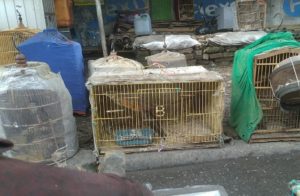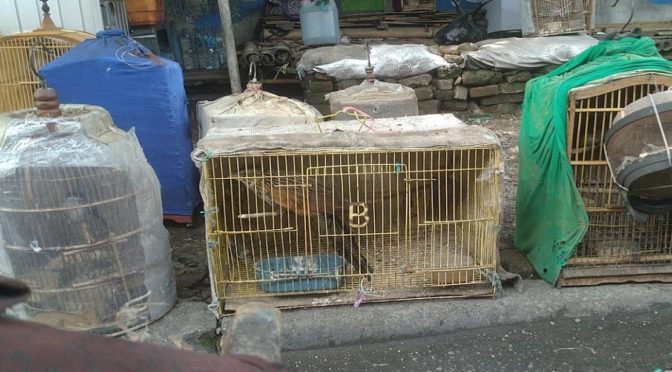Hi all! I am Rifqi, the Wildlife Trade Officer here at Little Fireface Project. It has been four months since I returned to the LFP team. Now a different activity than before (I started at LFP as a volunteer), as well as observing Javan slow lorises in the wild, I also conduct wildlife market surveys. Here, I need to collect data about all of animals traded, both protected and unprotected.

Market surveys focus on songbird species. Indonesia is a paradise for many species of birds, but the culture of songbirds is currently very popular and fashionable. As we know, many species of songbirds are treated as pets here. Many of these species are birds that are protected by law.
The biggest problem is knowledge of the sellers and buyers, they catch and hunt birds in the wild without knowing whether the birds are protected or not. A few also know about the animals that are protected, so why do they still catch and hunt from nature? This is based on their practicality in getting money as the captive permit is not easy to get and the seller must meet many requirements that are stipulated by law. So with or without realising it, by hunting these songbirds, they become one of the biggest threats to their extinction.

Some species of birds that are protected and traded are Bali myna, black-winged starling, leaf bird, Javan green magpie, common green magpie, crested jay, Javan sparrow, and many more. Many of the birds are breeders, but I cannot guarantee whether the breeding is legal. If it is illegal, the birds cannot be traded. Captive songbirds are identified using a ring, which details the identity and origin of the bird. However, rings are available in the market and are so easy to get it, what is difficult is the certificate.
The popularity of song birds has now begun to affect the small birds, like Javan white eyes and many sunbirds. Sellers capture these birds directly from the wild in large numbers, so of course this is a threat to their extinction. The government must be more stringent in managing the countless animal markets throughout Indonesia, especially in Java and Bali. Although many of these existing markets are legal, many animals are traded illegally and this must be regulated more closely if we are to protect these species from extinction.

